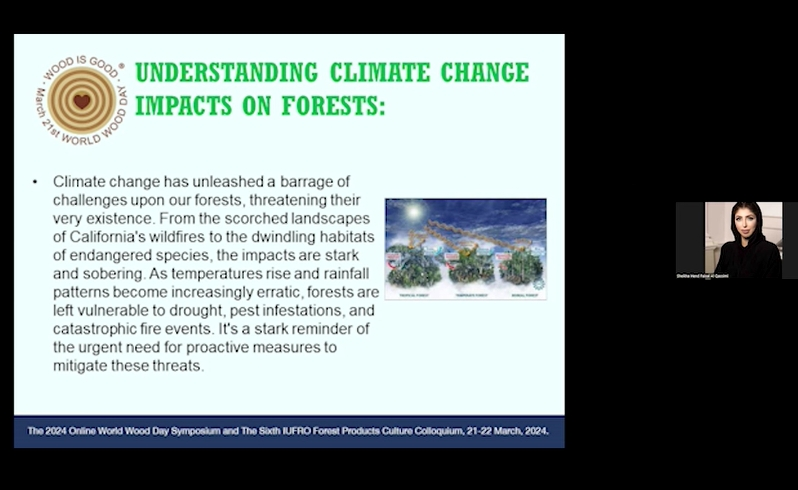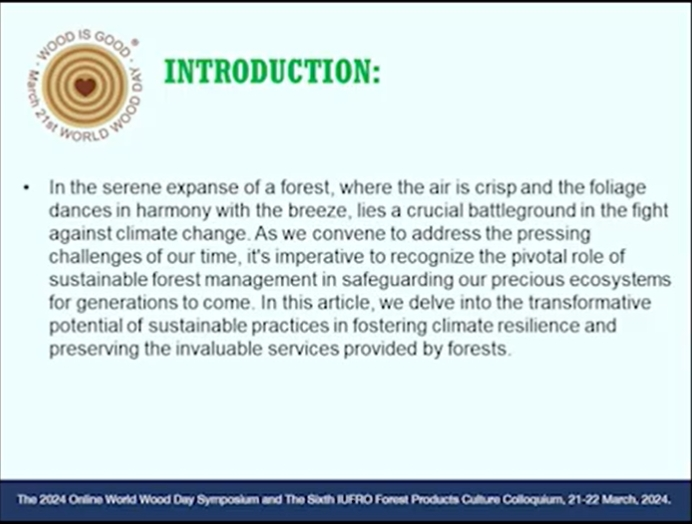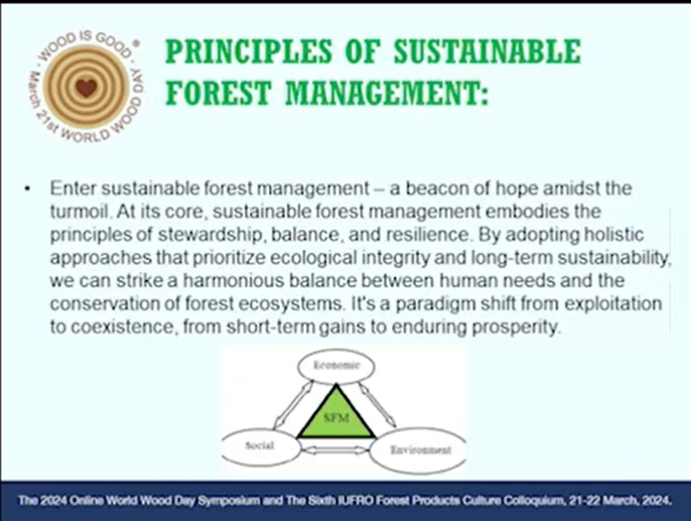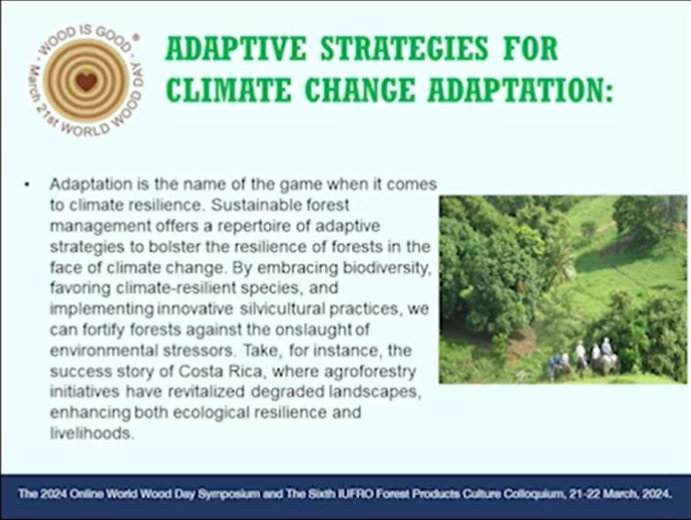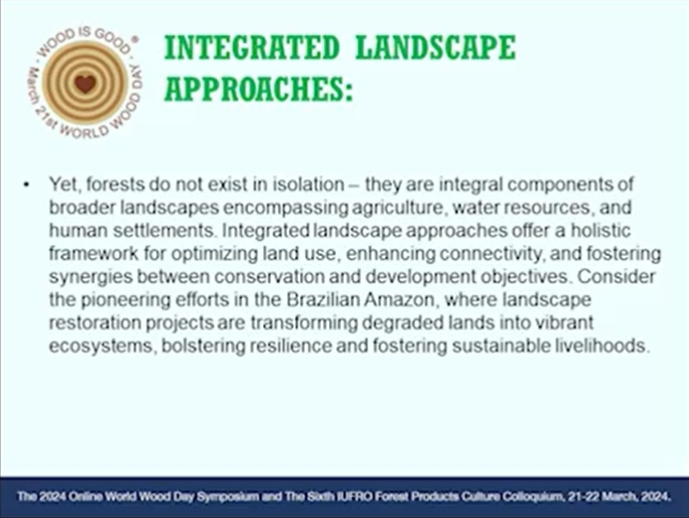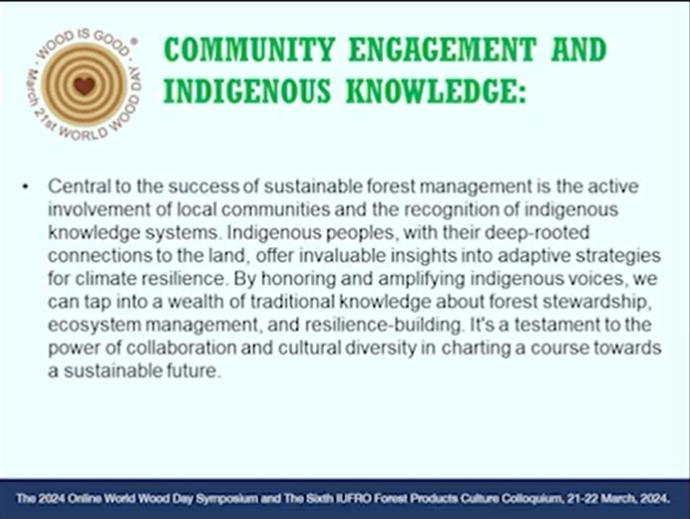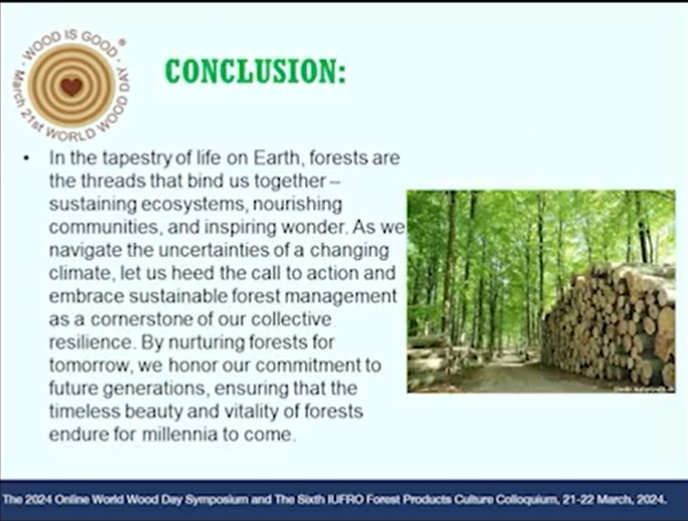会议名称:“2024世界木材日”研讨会暨第六届国际林联(IUFRO)林产品文化研究组讨论会
会议时间:2024年3月21-22日
报告嘉宾:Hend Faisal Al Qassimi
嘉宾简介:阿拉伯联合酋长国沙迦殿下
报告摘要:
Introduction: Hey there! Imagine taking a stroll through a lush forest, breathing in the fresh air, and listening to the gentle rustle of leaves. It's a beautiful scene, right? But did you know that forests are facing tough times due to climate change? Don't worry, though! In this article, we're diving into how sustainable forest management can help our beloved forests weather the storm of climate change and thrive for future generations.
In the serene expanse of a forest, where the air is crisp and the foliage dances in harmony with the breeze, lies a crucial battleground in the fight against climate change. As we convene to address the pressing challenges of our time, it's imperative to recognize the pivotal role of sustainable forest management in safeguarding our precious ecosystems for generations to come. In this article, we delve into the transformative potential of sustainable practices in fostering climate resilience and preserving the invaluable services provided by forests.
Understanding Climate Change Impacts on Forests: Climate change has unleashed a barrage of challenges upon our forests, threatening their very existence. From the scorched landscapes of California's wildfires to the dwindling habitats of endangered species, the impacts are stark and sobering. As temperatures rise and rainfall patterns become increasingly erratic, forests are left vulnerable to drought, pest infestations, and catastrophic fire events. It's a stark reminder of the urgent need for proactive measures to mitigate these threats.
Principles of Sustainable Forest Management: Enter sustainable forest management – a beacon of hope amidst the turmoil. At its core, sustainable forest management embodies the principles of stewardship, balance, and resilience. By adopting holistic approaches that prioritize ecological integrity and long-term sustainability, we can strike a harmonious balance between human needs and the conservation of forest ecosystems. It's a paradigm shift from exploitation to coexistence, from short-term gains to enduring prosperity.
Adaptive Strategies for Climate Change Adaptation: Adaptation is the name of the game when it comes to climate resilience. Sustainable forest management offers a repertoire of adaptive strategies to bolster the resilience of forests in the face of climate change. By embracing biodiversity, favoring climate-resilient species, and implementing innovative silvicultural practices, we can fortify forests against the onslaught of environmental stressors. Take, for instance, the success story of Costa Rica, where agroforestry initiatives have revitalized degraded landscapes, enhancing both ecological resilience and livelihoods.
Integrated Landscape Approaches: Yet, forests do not exist in isolation – they are integral components of broader landscapes encompassing agriculture, water resources, and human settlements. Integrated landscape approaches offer a holistic framework for optimizing land use, enhancing connectivity, and fostering synergies between conservation and development objectives. Consider the pioneering efforts in the Brazilian Amazon, where landscape restoration projects are transforming degraded lands into vibrant ecosystems, bolstering resilience and fostering sustainable livelihoods.
Community Engagement and Indigenous Knowledge: Central to the success of sustainable forest management is the active involvement of local communities and the recognition of indigenous knowledge systems. Indigenous peoples, with their deep-rooted connections to the land, offer invaluable insights into adaptive strategies for climate resilience. By honoring and amplifying indigenous voices, we can tap into a wealth of traditional knowledge about forest stewardship, ecosystem management, and resilience-building. It's a testament to the power of collaboration and cultural diversity in charting a course towards a sustainable future.
Investing in Resilient Forests for Future Generations: As we stand at the crossroads of history, the imperative to invest in resilient forests has never been clearer. Sustainable forest management is not just an environmental imperative – it's an investment in our collective well-being. From carbon sequestration and watershed protection to biodiversity conservation and livelihood support, forests provide a myriad of ecosystem services that underpin human prosperity. By prioritizing sustainable practices, we're not only securing the future of forests but also safeguarding the health and resilience of our planet for generations to come.
Conclusion: In the tapestry of life on Earth, forests are the threads that bind us together – sustaining ecosystems, nourishing communities, and inspiring wonder. As we navigate the uncertainties of a changing climate, let us heed the call to action and embrace sustainable forest management as a cornerstone of our collective resilience. By nurturing forests for tomorrow, we honor our commitment to future generations, ensuring that the timeless beauty and vitality of forests endure for millennia to come. By embracing sustainable forest management practices, we can nurture resilient forests that stand tall against the challenges of climate change. So, whether you're a tree hugger, a nature lover, or just someone who enjoys a good hike in the woods, let's join hands and work together to ensure that forests continue to thrive for generations to come.
Bibliography for the article:
1.Intergovernmental Panel on Climate Change. (2019). IPCC Special Report on Climate Change and Land. Retrieved from https://www.ipcc.ch/srccl/
2.Food and Agriculture Organization of the United Nations. (2020). State of the World’s Forests 2020. Retrieved from http://www.fao.org/state-of-forests/en/
3.United Nations Environment Programme. (2019). Global Forest Resources Assessment 2020. Retrieved from https://www.fao.org/forest-resources-assessment/en/
4.Costa Rica Ministry of Environment and Energy. (2018). National Forestry Financing Fund: Promoting sustainable forest management in Costa Rica. Retrieved from https://www.fonafifo.go.cr/english
5.Instituto Nacional de Pesquisas da Amazônia. (2020). Amazon Conservation and Sustainable Development: Projects and Initiatives. Retrieved from https://www.inpa.gov.br/socioambiental/
6.Indigenous Peoples' Center for Documentation, Research and Information (Docip). (2020). Indigenous Peoples and Climate Change: An Overview. Retrieved from https://www.docip.org/en/climate-change/
责任编辑:iwcs25H


 1,524
1,524